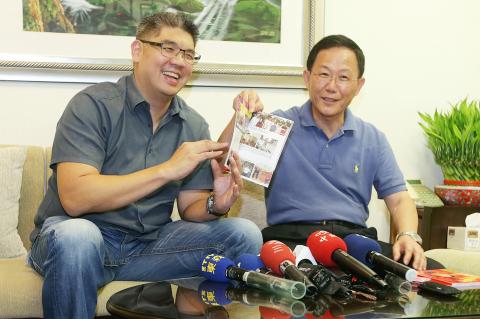With support for the Chinese Nationalist Party (KMT) in local cities and counties dipping following a series of corruption cases involving KMT officials, the party is considering involving its outgoing county and city heads in its inner workings, promising them better positions with the party depending on how they help out in the year-end elections.
Ongoing investigations into potential corruption in an affordable housing project in Taoyuan County’s Bade District (八德) and the Public Works Department of New Taipei City, and alleged bribery involving Keelung Council Speaker Huang Ching-tai (黃景泰), plus the indictment last year of then-Nantou county commissioner Lee Chao-
ching (李朝卿) on corruption charges, have reflected poorly on the KMT.

Photo: CNA
According to party sources, several county commissioners and city mayors have been placed on a watch list by the party due to sliding support ratings.
For example, Changhua County is regarded as an important battlefield, but disputes are getting in the way, the sources said.
KMT Legislator Lin Tsang-min (林滄敏), who won the party primary to run in the year-end Changhua County commissioner election, is reportedly at odds with Changhua County Commissioner Cho Po-yuan (卓伯源), who is said to prefer Changhua County Deputy Commissioner Ko Cheng-fang (柯呈枋) to be his successor, the sources said.
Lin reportedly met with KMT Deputy Chairman Tseng Yung-
chuan (曾永權), the party’s election manager, asking for intervention.
“As long as the battle is won, party central would ‘arrange’ a position,” the source quoted Tseng as saying, adding however that Tseng had also said he could not promise what the position would be.
The same issue has occurred in Miaoli County, where Miaoli County Commissioner Liu Cheng-hung (劉政鴻) is reportedly at odds with KMT Miaoli County commissioner candidate Hsu Yao-chang (徐耀昌) after Liu’s “designated” successor lost the party primary, the sources said.
The KMT’s efforts in Chiayi City has also suffered some setbacks, according to the sources.
During a recent city government event, Chiayi KMT mayoral candidate Chen Yi-chen (陳以真) was asked not to wear a vest with the party logo and her name on it and was denied participation in a ceremonial lifting of a cloth from a plaque, the sources said.
However, Democratic Progressive Party (DPP) candidate Twu Shiing-jer (涂醒哲) wore a DPP vest on stage at the event.
The local campaign office is perplexed at the different standards, and there are voices within the party calling for a notice to be given to KMT Chiayi Mayor Huang Min-hui (黃敏惠), the sources said.
Meanwhile, of the seven county commissioners and city mayors who are to leave their posts after the elections, Taipei Mayor Hau Lung-bin (郝龍斌) is currently not favored within the KMT due to his criticism of President Ma Ying-jeou’s (馬英九) administration’s policies and his support of requests such as medical parole for former president Chen Shui-bian (陳水扁), the sources said.
Huang, on the other hand, currently has the greatest chance to rise in the KMT, but if she fails to hold on to Chiayi City, it would be a large stain on her resume, the sources added.

The US government has signed defense cooperation agreements with Japan and the Philippines to boost the deterrence capabilities of countries in the first island chain, a report by the National Security Bureau (NSB) showed. The main countries on the first island chain include the two nations and Taiwan. The bureau is to present the report at a meeting of the legislature’s Foreign Affairs and National Defense Committee tomorrow. The US military has deployed Typhon missile systems to Japan’s Yamaguchi Prefecture and Zambales province in the Philippines during their joint military exercises. It has also installed NMESIS anti-ship systems in Japan’s Okinawa

‘WIN-WIN’: The Philippines, and central and eastern European countries are important potential drone cooperation partners, Minister of Foreign Affairs Lin Chia-lung said Minister of Foreign Affairs Lin Chia-lung (林佳龍) in an interview published yesterday confirmed that there are joint ventures between Taiwan and Poland in the drone industry. Lin made the remark in an exclusive interview with the Chinese-language Liberty Times (the Taipei Times’ sister paper). The government-backed Taiwan Excellence Drone International Business Opportunities Alliance and the Polish Chamber of Unmanned Systems on Wednesday last week signed a memorandum of understanding in Poland to develop a “non-China” supply chain for drones and work together on key technologies. Asked if Taiwan prioritized Poland among central and eastern European countries in drone collaboration, Lin

BACK TO WORK? Prosecutors said they are considering filing an appeal, while the Hsinchu City Government said it has applied for Ann Kao’s reinstatement as mayor The High Court yesterday found suspended Hsinchu mayor Ann Kao (高虹安) not guilty of embezzling assistant fees, reducing her sentence to six months in prison commutable to a fine from seven years and four months. The verdict acquitted Kao of the corruption charge, but found her guilty of causing a public official to commit document forgery. The High Prosecutors’ Office said it is reviewing the ruling and considering whether to file an appeal. The Taipei District Court in July last year sentenced Kao to seven years and four months in prison, along with a four-year deprivation of civil rights, for contravening the Anti-Corruption

NO CONFIDENCE MOTION? The premier said that being toppled by the legislature for defending the Constitution would be a democratic badge of honor for him Premier Cho Jung-tai (卓榮泰) yesterday announced that the Cabinet would not countersign the amendments to the local revenue-sharing law passed by the Legislative Yuan last month. Cho said the decision not to countersign the amendments to the Act Governing the Allocation of Government Revenues and Expenditures (財政收支劃分法) was made in accordance with the Constitution. “The decision aims to safeguard our Constitution,” he said. The Constitution stipulates the president shall, in accordance with law, promulgate laws and issue mandates with the countersignature of the head of the Executive Yuan, or with the countersignatures of both the head of the Executive Yuan and ministers or